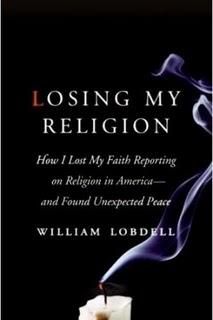Losing My Religion: How I Lost My Faith Reporting on Religion in America and Found Unexpected Peace

Faith: not wanting to know what is true.- Frederick Nietzsche
William Lobdell was a twenty-something flake. He blew one marriage and was on his way to blowing a second when a friend dragged him to a gathering of evangelical Christians. Lobdell was born again, and he started attending Sunday services. His wife, a lapsed Catholic, appreciated his newfound Christianity and joined with him in a subsequent odyssey through various Christian denominations. Lobdell was a born again with one difference: he was a journalist. By perseverance and prayer Lobdell convinced his bosses at the Los Angeles Times to put him on the religion beat. For eight years he reported on matters of faith. He interviewed Rick Warren, the pastor of Saddleback Church in Riverside, California and author of The Purpose Driven Life who spoke at Obama’s Presidential Inauguration. Lobdell was skeptical of Warren at first, but discovered him to be a plain guy who inspires other people—and is apparently never alone in a room with a woman unless she is his wife. Lobdell was as convinced of Warren as he was of the Lubavitchers, a Jewish sect that has been quite successful the last thirty years in motivating Jews to return to their religion.
Lobdell tried several Protestant congregations, but eventually decided Catholicism was the true Christianity. While a Christian, Lobdell prayed constantly. Once he prayed for $50,000, and how he got the money makes for an improbable—but true—anecdote. By and large, Lobdell was happy with his job and religion. When he was attending a year-long curriculum for Catholic converts, the news broke of the widespread molestation of children by priests and the attendant cover-up by church hierarchy. As the LA Times religious reporter, he covered the scandal. He saw in the church’s documents and at trials of priests the heinous criminal behaviour committed by supposed men of God. He faced the moral turpitude of the episcopacies sweeping the issue under the rug and—when this infamy wouldn’t disappear, but worsened—blaming the victims. He witnessed firsthand his soon-to-be fellow Catholics anger not at priests and the administration that had furthered the rape of children by transferring culpable priests from parish to parish, but at the victims who wouldn’t back down and demanded legal and financial redress for years of suffering.
The scandal shook Lobdell’s theodicy. He had allayed by means of the usual answer the contradiction of evil’s presence in a world that—according to faith—is closely supervised by a benevolent deity (i.e., we mere humans cannot possibly understand God’s plan). Now he saw evil close up, an evil perpetrated by men claiming to be God’s earthly representatives.
Lobdell dropped out of his Catholic convert program. Despite the ministration of Christian friends, he acknowledged to himself that bad things happen in the world, and there is no explaining this by appealing to a God with plans for us that we can never know. In short, Lobdell lost his faith and lost the idea of that God by which Christianity, Islam, and other faiths beguile, comfort, and frighten humans into religious belief.
There is something peculiarly, provincially American about Lobdell’s journey that speaks to the country’s obsession with religion, and its immaturity in spiritual matters. The question of a divine providence at work in human reality is a question much of Europe struggled with during the Enlightenment. The First and Second World Wars and the Holocaust seem prima facie confirmation for at the very least a divinity disinterested in acting directly in human affairs. That America has never torn itself apart in the sort of insane cataclysm that Europe did may be the reason why Americans still find religion to be a subject of such heated argument.
It is also of interest in the context of this book to consider alcoholism, Twelve-Step Programs, and the American obsession with religion. When Lobdell has doubts about God, he drinks. For Americans, it seems when they lose their religion they turn to booze. When alcohol ruins their lives, they turn to the Twelve Steps, which returns them to God. Lobdell never joins a Twelve-Step Program. When he loses his faith for good, he is comfortable with it and does not start drinking again. That itself is a worthy triumph and makes for a happy ending. Losing My Religion began life as a 3,800-word piece that Lobdell wrote for the Los Angeles Times. It was the last article he wrote as the newspaper’s religion writer. The article is concise while the book-length treatment contains many fleshed-out anecdotes, extra facts and stories, and lengthy portraits. The additional material is mostly helpful, but in sum Lobdell’s narrative seems a little padded because of it. The book version could profit from being more succinct by about twenty pages.
Special thanks to David Watson for his invaluable help in clarifying the meaning of Twelve-Step Programs in the American religious context.
How can you lose something you never had? With Catholic training real faith is almost impossible to have. We are save by grace not by works. Salvation is belief in Christ and Christ alone.
A catchy book title but misleading. A better title would be "Looking for faith, but never finding it" A sad title indeed.